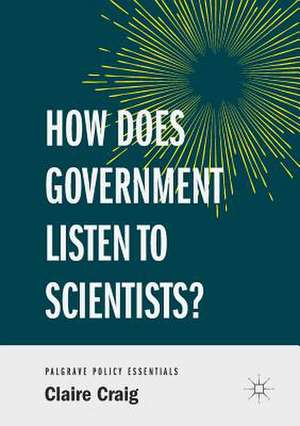How Does Government Listen to Scientists?
Autor Claire Craigen Limba Engleză Paperback – 11 aug 2018
This Palgrave Policy Essential draws together recent developments in the field of science in government, policy and public debate. Practice and academic insights from a wide variety of fields have both moved on in the last decade and this book provides a consolidated survey of the relatively well established but highly scattered set of insights about the provision of deeply technical expertise in policy making (models of climate or disease, risk, Artificial Intelligence and ethics, and so on). It goes on to link this to emerging ideas about futures thinking, public engagement, narrative, and the role of values and sentiment alongside the place of scientific and scholarly insights in public decision-making and debate. The book offers an accessible overview aimed at practitioners; policy-makers looking to understand how to work with researchers, researchers looking to work with policy-makers, and the increasing numbers and types of “brokers” - people working at the interface,in science advice, public engagement and communication of science, and in expert support to decision-making in the public and private sectors. In addition to outlining recent insights and placing them in the established frameworks of authors such as Pielke and Jasanoff, the book also brings in relevant areas less traditionally associated with the subject but of increasing importance, such as modelling, futures and narrative.
Preț: 114.60 lei
Nou
Puncte Express: 172
Preț estimativ în valută:
21.93€ • 22.81$ • 18.11£
21.93€ • 22.81$ • 18.11£
Carte disponibilă
Livrare economică 24 martie-07 aprilie
Preluare comenzi: 021 569.72.76
Specificații
ISBN-13: 9783319960852
ISBN-10: 3319960857
Pagini: 60
Ilustrații: XIII, 70 p.
Dimensiuni: 148 x 210 x 19 mm
Greutate: 0.12 kg
Ediția:1st ed. 2019
Editura: Springer International Publishing
Colecția Palgrave Macmillan
Locul publicării:Cham, Switzerland
ISBN-10: 3319960857
Pagini: 60
Ilustrații: XIII, 70 p.
Dimensiuni: 148 x 210 x 19 mm
Greutate: 0.12 kg
Ediția:1st ed. 2019
Editura: Springer International Publishing
Colecția Palgrave Macmillan
Locul publicării:Cham, Switzerland
Cuprins
Chapter 1 How to create the conditions where science can help.- Chapter 2: How to express risk, confidence and (un)certainty.- Chapter 3: How to think about the future.- Chapter 4: How to engage with publics.- Chapter 5: How to ensure that when a Minister meets a Nobel Laureate they both have a great encounter.
Notă biografică
Claire Craig CBE is Chief Science Policy Officer at the Royal Society, the independent scientific academy of the UK and the Commonwealth, dedicated to promoting excellence in science. She previously led the Government Office for Science on behalf of two UK Government Chief Scientific Advisors. She established the UK’s Foresight programme of science-based strategic futures projects, covering topics from flood risk to cognitive enhancement and was a Faculty member of the World Economic Forum. Claire has worked extensively on strategy and science in decision-making. Her career includes periods at McKinsey & Co and the Prime Minister’s Delivery Unit. She helped launch a hands-on science centre in her home town (Bristol), and has held Board roles at a variety of research and teaching institutions including the Council of King’s College London and the Governing Body of Newnham College Cambridge. She trained originally as a geophysicist.
Textul de pe ultima copertă
This Palgrave Policy Essential draws together recent developments in the field of science in government, policy and public debate. Practice and academic insights from a wide variety of fields have advanced in the last decade and this book provides a consolidated survey of the established but scattered insights into the provision of deeply technical expertise in policy making: models of climate or disease, risk, Artificial Intelligence and ethics amongst others. It goes on to link this to emerging ideas about futures thinking, public engagement, narrative, and the role of values and sentiment alongside the place of scientific and scholarly insights in public decision-making and debate. The book offers an accessible overview aimed at practitioners, policy-makers looking to understand how to work with researchers, researchers looking to work with policy-makers, and the increasing numbers and types of “brokers” - people working at the interface, in science advice, public engagement and communication of science, and in expert support to decision-making in the public and private sectors.
Claire Craig CBE is Chief Science Policy Officer at the Royal Society. She previously led the Government Office for Science on behalf of two UK Government Chief Scientific Advisors. She established the UK’s Foresight programme of science-based strategic futures projects, covering topics from flood risk to cognitive enhancement and was a Faculty member of the World Economic Forum. Claire has worked extensively on strategy and science in decision-making. Her career includes periods at McKinsey & Co and the Prime Minister’s Delivery Unit. She helped launch a hands-on science centre in Bristol, and has held Board roles at a variety of research and teaching institutions including the Council of King’s College London and the Governing Body of Newnham College Cambridge.
Caracteristici
Palgrave Policy Essentials are short books on a range of policy-relevant subjects, written in an accessible style Authored by the Royal Society's Chief Science Policy Officer, a previous leader of the Government Office for Science Argues that inter-disciplinary knowledge transfer can help speed up the development and use of practical insights for science in Government Discusses the provision of technical insight on an extensive range of topics, including climate change, risk, disease prevention and artificial intelligence
